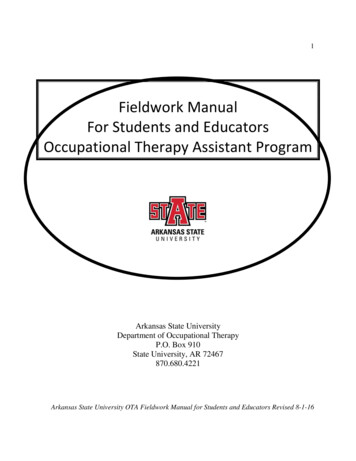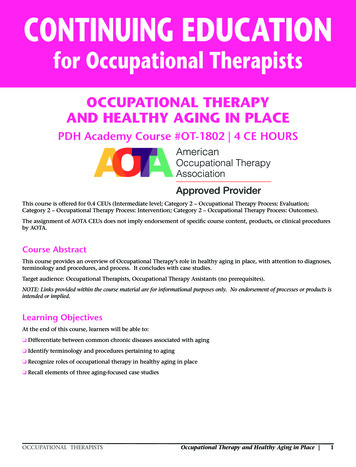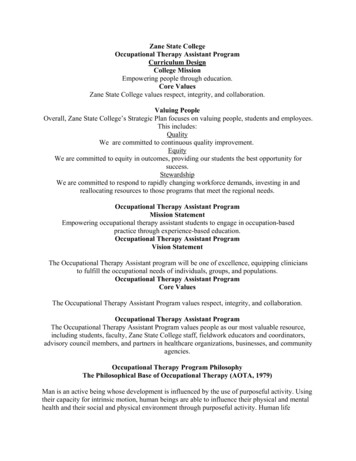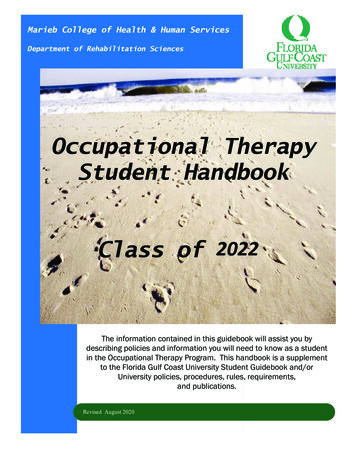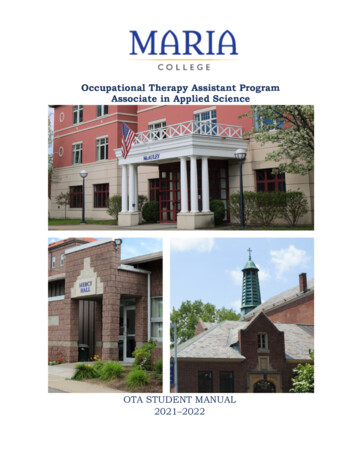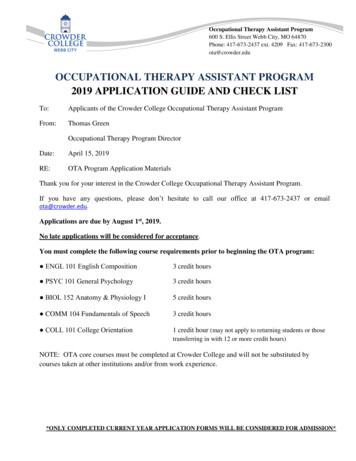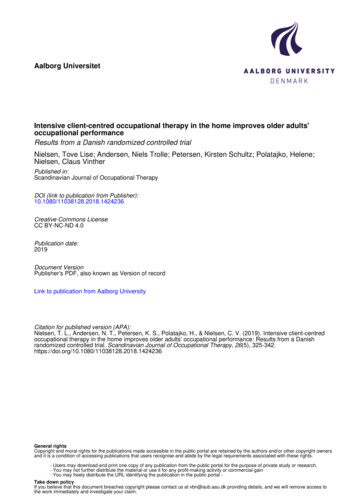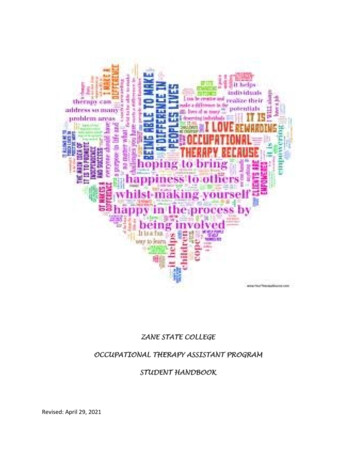
Transcription
ZANE STATE COLLEGEOCCUPATIONAL THERAPY ASSISTANT PROGRAMSTUDENT HANDBOOKRevised: April 29, 2021
INTRODUCTIONWelcome to the Occupational Therapy Assistant program and the field of occupational therapy. Youhave chosen to become a member of one of the fastest growing health care professions in the UnitedStates. Nationally job outlooks for occupational therapists and assistants are excellent withemployment opportunities in hospitals, rehabilitation centers, mental health centers, nursing homes,residential centers, schools, home health agencies, private practice and industry. Therapists andassistants may work with persons of all ages with a variety of special needs, including emotional andphysical disabilities, developmental delays, learning disabilities, and limitations imposed by the agingprocess. The occupational therapy assistant works under the direct supervision of the registeredoccupational therapist in assessing the patient/client’s needs, establishing treatment goals andimplementing treatment. Occupational therapy assistants fulfill various other roles in the managementof occupational therapy services and assist in overall program management and development.This handbook is a guide to you as you prepare to become an occupational therapy assistant. Theinformation in this handbook are the policies and procedures for the Zane State College OTA Program.You are required to sign the last page of the handbook and turn it in. This will serve as verification thatyou read the handbook and that you agree to follow the policies and procedures contained within.Included is information regarding entrance into the program, class structure and goals, fieldworkrequirements, personal appearance, professional behavior, expectations and other general information.COLLEGE MISSIONEmpowering people through education.CORE VALUESZane State College values respect, integrity, and collaboration.VALUING PEOPLEOverall, Zane State College’s Strategic Plan focuses on Valuing People, students and employees. Thisincludes:QualityWe are committed to continuous quality improvement.EquityWe are committed to equity in outcomes, providing our students the best opportunity for success.StewardshipWe are committed to respond to rapidly changing workforce demands, investing in and reallocatingresources to those programs that meet the regional needs.Occupational Therapy Assistant ProgramMission StatementEmpowering occupational therapy assistant students to engage in occupation-based practice throughexperience-based education.1
Occupational Therapy Assistant ProgramVision StatementThe Occupational Therapy Assistant program will be one of excellence, equipping clinicians to fulfill theoccupational needs of individuals, groups, and populations.Occupational Therapy Assistant ProgramCore ValuesThe Occupational Therapy Assistant Program values respect, integrity, and collaboration.Occupational Therapy Assistant ProgramValues PeopleThe Occupational Therapy Assistant Program values people as our most valuable resource, including thestudents, faculty, Zane State College staff, fieldwork educators and coordinators, advisory councilmembers, and partners in healthcare organizations, businesses, and community agencies.PHILOSOPHYThe Occupational Therapy Assistant Program at Zane State College adopts the philosophy of educationof the American Occupational Therapy Association (2018) that states:PHILOSOPHY OF OCCUPATIONAL THERAPY EDUCATIONRevised 2018PreambleOccupational therapy education prepares occupational therapy practitioners to address theoccupational needs of individuals, groups, communities, and populations. The education processincludes academic and experiential components (fieldwork, capstone, continuing education). Thephilosophy of occupational therapy education parallels the philosophy of occupational therapy yetremains distinctly concerned with beliefs about knowledge, learning, and teaching.What Are the Fundamental Beliefs of Occupational Therapy Education?Students are viewed as occupational beings who are in dynamic transaction with the learning contextand the teaching–learning process. The learning context includes the curriculum and pedagogy andconveys a perspective and belief system that include a view of humans as occupational beings,occupation as a health determinant, and participation in occupations as a fundamental human right.Education promotes professional and clinical reasoning; critical thinking; cultural understanding; and theintegration of professional values, theories, evidence, ethics, and skills. This approach will preparepractitioners to collaborate with clients to achieve health, well-being, and participation in life throughengagement in occupation (American Occupational Therapy Association, 2014b). Occupational therapyeducation is an ongoing process that shapes a practitioner’s professional identity.What Are the Values Within Occupational Therapy Education?Enacting these beliefs to facilitate the development of a sound reasoning process that is client centered,occupation based, and theory driven while also encouraging the use of best evidence and outcomesdata to inform the teaching–learning experience may include supporting Active, engaging, diverse, and inclusive learning within and beyond the classroom environment;2
A collaborative process that builds on prior knowledge and experience; Continuous professional judgment, evaluation, and self-reflection; and Lifelong learning and continuous advocacy for the profession and society’s occupational needs.The Commission on Education:Steven Taff, PhD, OTR/L, FAOTA, ChairpersonAdopted by the Representative Assembly Coordinating Council for the Representative Assembly, 2018STUDENT OUTCOMESThe purpose of the Occupational Therapy Assistant program is to provide healthcare professionals who,under the supervision of a registered, licensed occupational therapist, can assist disabled or at riskpersons of all ages acquire, maintain, or regain necessary life skills.An entry-level practitioner with an associate of applied science degree in Occupational Therapy Assistantfrom Zane State College will be able to:A. Demonstrate knowledge of occupational therapy theory, philosophy and ethics.B. Demonstrate the ability to assist in the OT process of evaluation, treatment planning,documentation, and discharge as directed by an OTR.C. Demonstrate the ability to independently implement occupational therapy treatment, andmonitor clients’ appropriateness and readiness for activities through the selection, instruction,adaptation, and gradation of treatment activities using a variety of media and techniques,following collaboration with an OTR.D. Demonstrate professional responsibility, ethics, and interpersonal communication, which areappropriate and/or therapeutic for direct interaction with clients, interdisciplinary teammembers, family, and others involved with the client’s intervention.3
CLASS EXPECTATIONSAttendance and Absence PoliciesAttendance policies coincide with procedures required by clinical sites and employers for purposes ofassisting students in development of necessary professional behaviors. Consistent attendance at classesis required for all OTA students and is involved in the assessment of the course grade. Most syllabiinclude points for attendance or are structured to encourage consistent attendance. Reasonableabsences for illness, family difficulties, transportation problems, etc., are acceptable if these do notoccur regularly and if the student remains responsible for obtaining information missed in class. If astudent is absent from class, the student must notify the instructor in person or by phone, or leave avoice message for the instructor prior to the absence, if possible, or if not possible later during the day.Email is not acceptable for initial notification. The student should communicate with the instructorbefore the next class meeting regarding any assignments, handouts or announcements, which weremissed during class. The student should also check with the instructor on the content of the class tomake sure that he/she can get adequate notes from other students on any lecture or lab materials.Please note that a message can be left on OTA faculty voice mail at any time. Rachel’s number is 740588-1313 and Jen’s number is 740-588-1220. Class attendance points will be deducted in accordancewith syllabus regardless of the reason for the absence. Entering class late presents difficulty, if it occursregularly. It results in the student missing content and in disruption of the class, and thus lost time forthose who have already been in class. Although it is understandable that arriving late occasionally maybe unavoidable, consistent lateness, or a pattern of lateness, throughout a course is unacceptable.Leaving class early is equally disruptive and unacceptable. Reasonable excuses for tardiness or earlydeparture will be considered on an individual basis. Being late for class in excess of four times persemester, however, can result in reduction of the course grade. Please advise your instructor as to whyyou have been late or call ahead of time to notify the instructor you will be late.Missed Assignments, Tests, PresentationsIf a student misses a class where he or she is to present a project or when a test is scheduled, thestudent needs to contact the instructor to request the opportunity to make up the test or to reschedulethe presentation if possible. Except in extreme cases, the test must be made up before the next classmeeting of the course. If the test is not completed before the next class meeting, the test may not betaken and no credit will be granted. If an extreme circumstance prevents a test from being taken beforethe next session, the student with the instructor must make specific arrangements. If the presentationis one that can be rescheduled, this should be done during the next available class meeting. If thepresentation cannot be made up, due to class scheduling, the student must make a specific arrangementwith the instructor to present individually, or to do an alternative version of the presentation accordingto the instructor’s guidelines. Unfortunately, due to numbers of students and scheduling of classes,absence may limit the student from obtaining the opportunity to make-up missed presentations.Late Work PoliciesAssignments should be turned in by the required due date. The following is the policy for lateassignments: late assignments will not be accepted unless the instructor has been notified 24 hours inadvance. When notifying the instructor, the student must explain and place in writing (email isacceptable) why the assignment will be late and decide on a specific date when the assignment will behanded in. The instructor will evaluate the reasons and the timeline and advise the student as towhether the assignment will still be eligible for full credit. If not, the student will be advised as to how4
much credit the assignment is worth. The assignment then must be handed in on the new deadline;otherwise, the assignment will not be accepted for credit. If for some reason you are absent on the dayan assignment is due, you are expected to make arrangements with your instructor to submit yourassignment. If not, you must notify the instructor that day or leave a message for the instructor and theassignment will be subject to point deductions for lateness. Specific course syllabi should be consultedfor additional class policies re: assignments and timeliness. In order to assure competency, it isnecessary for students to complete every assignment required for each OTA course, even if reducedcredit or no credit is earned for the work.Inclement/Hazardous Weather/Reporting to Clinical SitesDuring clinical assignments, students are often expected to report by 6:00 or 7:00 a.m. This frequentlyrequires the student to leave home before the College has made the announcement of delayed start orclosure due to inclement weather. Before departing, the student should use his/her own best judgmentin determining road suitability for travel. If a student judges the road conditions unsafe for travel,he/she should notify, by phone, the clinical site (before reporting time) and the course instructor/facultyadvisor. The student is not expected to travel in unsafe conditions. Absences/tardiness due tohazardous travel conditions will be evaluated individually and students will not be penalized if deemedto be appropriate. In most situations, however, hours missed will need to be made up. Fieldwork sitesare advised to use the same attendance polices that would be expected of their employees.Lab GuidelinesThe OTA Lab is generally very active and involves a large number of students doing a variety of activities.It is important that all students be attentive to the activities done and the process needed for labs.Because many of the labs involve use of activities and space, it is important that all students strictlyadhere to procedures for use of equipment and supplies, as well as clean up and maintenance needs.Every student is responsible for assisting in lab upkeep. This expectation matches clinical and futureemployer expectations.All students are responsible to put away supplies and clean up their own work area. Once all studentshave cleaned up their individual area, these students should work on making sure that the whole lab isclean and obtain the help of other students as necessary. STUDENTS ARE TO REMAIN IN THELABORATORY UNTIL THE INSTRUCTOR VERIFIES THAT CLEAN UP IS SATISFACTORY! This applies even ifsome students complete their work ahead of others.During laboratories, students should make sure that they are aware of where all supplies and equipmentbelong so that they are able to put these supplies away. Students should also make sure that they areaware of how to use equipment and supplies before doing so. Students should use their time effectivelybased on the assignments and input given by the instructor. Thus, there will be an automatic deductionof points for laboratory activities for misplaced supplies, incorrect use of equipment, or poor utilizationof time. The instructor will notify the student when they have lost points.Policy for Infection Control In OTA LaboratoryIn the best interest of all individuals who use the OTA Program Laboratory space, the following policiesmust be followed:5
Students and faculty members are encouraged to wash hands or use hand sanitizer whenarriving to the OTA lab and again when leaving.An acceptable surface cleaner will be available in the OTA lab. Should you not find any, informthe instructor or contact Facilities Management for replacement.Table surfaces, counter tops, and equipment should be wiped down with the surface cleanerwhen noticeably soiled, or after use in simulation of treatment, that involves activity other thanroutine handling of objects.Anyone using the lab kitchen space or equipment will wash, dry and put away his or her owndishes before leaving the area.If the microwave is used it should be wiped out with a damp cloth after each use.Students should put soiled linens in the washing machine for washing when next load is done. Ifthere are enough items for a full load, the washer should be started at the end of class, and anote written on the white board alerting other students and faculty of need to move items tothe dryer and start at the end of their class. In the event that others will not be in the lab within24 hours, the student or faculty member should notify all OTA faculty members so they canmake arrangements for completion or delegation of the laundry task.When large messes occur Facilities Maintenance staff should be notified of the need for cleanup, or the area cleaned up by students and/or faculty members if Facilities staff is not readilyavailable. In the event that clean-up is done by students and/or faculty members, Facilities staffshould still be notified for more thorough cleaning.All OTA students and faculty members are responsible for maintaining the OTA lab refrigeratorby frequently reviewing items within and throwing away spoiled or outdated items. If personalitems are put in the refrigerator or freezer they must be marked with name and date put intothe refrigerator.OTA students and faculty will follow COVID-19 guidelines set by Zane State College, inaccordance with the CDC, as well as state and local public Health Departments. This mayinclude wearing a mask, goggles, and social distancing in the classroom and lab setting.*Failure to comply with these procedures may result in loss of points within courses, or loss of pointswithin faculty performance appraisal.Policy for Handling Complaints against the ProgramConcerns made regarding grades or academic activities within courses must be made known using theGrade Appeals and Academic Complaint Policy published in the Zane State College Catalog, as includedbelow.GRADE APPEALS PROCEDUREAppeals and concerns regarding the validity of final grades must be initiated within 30 days after the endof the given semester.Students must adhere to the following steps when addressing grade appeals or academic complaints:Step 1: Contact the instructor to discuss the issue.Step 2: If not satisfied with the results of Step 1, contact the appropriate Division Dean for the givencourse.6
Step 3: If still dissatisfied, a letter should be addressed to the Provost. The letter should clearly detail thesteps that already been taken and contain the facts of the case. A request for a hearing before theProvost also should be included.Step 4: Upon considering information provided at the student hearing, the Provost shall make a final andbinding decision regarding action of the grade appeal.If no grade appeal is initiated within 30 days, the final, relevant academic decision will stand except for acase in which there has been an error in the mathematical calculation of the grade.Academic Complaints (including Quarter to Semester appeals)Students with academic complaints such as disruptive or inappropriate classroom environment,inappropriate instructor conduct, or degree completion must adhere to the following steps whenaddressing their concern:Step 1: It is highly recommended that the student contact the instructor to discuss the issue.Step 2: If not satisfied, or, if the student is not comfortable meeting with the instructor, contact theappropriate Division Dean.Step 3: If still dissatisfied, a letter should be addressed to the Provost. The letter should clearly detail thesteps thathave already been taken and contain the facts of the case. A request for a hearing before the Provostalso should be included.Step 4: Upon considering information provided at the student hearing, the Provost shall make a final andbinding decision regarding action of the academic complaint.Assignment GuidelinesThe following guidelines must be followed for all written assignments unless otherwise noted byinstructor or on the syllabus:1.All written work must be done in black pen, on plain white or lined notebook paper or wordprocessed; no ragged edges, tears, etc., will be accepted. Writing must be easily legible.2.All written work should be titled as to the name of the assignment and date. Your name shouldbe easily visible.3.Spelling, punctuation and grammatical errors should be monitored closely. The instructor willbe marking any corrections and points will be deducted from final scores if there are spelling,punctuation, and other grammatical errors.Knowledge and completion of assignments is your responsibility! It is recommended that you regularlycheck your syllabus for due dates and that you periodically check the Blackboard gradebook to makesure you have earned a grade for all assignments. If there are any incomplete or missing grades, youshould follow-up with the course instructor to create a plan for completion of all course assignments.Guidelines for completion of assignments and due dates will be given in class. If you are unsure of anassignment, it is up to you to request clarification. Attentiveness to both lecture and lab informationand activities are critical for your success in the OTA program. Unnecessary review caused byinattentiveness limits time and energy which could be used for other learning activities.Course grades are determined on the basis of points earned for individual assignments, exams, andother assessments of learning. The student needs to take responsibility for keeping track ofpoints/grades during the course; any questions should be immediately referred to the course instructor.The instructor can provide feedback on performance and anticipated course grades at or after midterm7
when enough assignments have been received to reasonably make this determination. If the instructorfeels a student may not attain a satisfactory grade in the course, the student will be notified as soon asthis becomes evident.Regarding problem resolution, OTA students are encouraged to communicate regularly with theinstructor regarding concerns or difficulties experienced in any classes or course work. If an issue arisesthat affects the majority of the class, these will be addressed with the class as a whole. Individual issuesor problems will be discussed privately with students. Every effort will be made to accommodateindividual needs of the students. Basic guidelines and limits must be established and followed to assurefairness and quality to all OTA students. Communication and professional behavior will be emphasizedin all classes.Regarding academic honesty, students are expected to be honest and independent with regard to allassignments and tests. Cheating and plagiarism will not be tolerated. If this should occur, the courseinstructor will automatically pursue action outlined in the Zane State College Code of Conduct andStudent Handbook.Academic Integrity ProcedureIf an instructor suspects a student of academic misconduct:Step 1: Instructor meets with the student(s) to discuss the behavior and/or act in question to determineits intentionality and checks available records to determine if other similar offenses have been reported.If it is determined a situation involved intentional academic misconduct:Step 2: Instructor collects and maintains documentation and materials of the alleged incident.Step 3: Instructor completes the Academic Integrity Report Form (AIRF) and submits it to his or herAcademic Dean.Step 4: The Academic Dean, with input from the instructor, will make a consequence recommendationwithin five (5) business days of receiving the AIRF.If the instructor and Academic Dean are in agreement regarding the consequence:Step 5: The instructor will verbally communicate the consequence to the student.Step 6: The Academic Dean will formally notify the student of the consequence via a letter delivered byregular or certified mail or by personal delivery within five (5) business days of the decision. TheAcademic Dean will forward copies of the letter to the instructor, the student’s advisor of record, theProvost, the Registrar, and the Chief StudentAffairs Officer. The communication will include a copy of the Grade Appeals and Academic Complaintsprocedure. In the event that the student requests a hearing, procedures will be followed as outlinedunder the Student Code of Conduct, “Hearings and Appeals” section.If the instructor and Academic Dean are not in agreement regarding the consequence:Step 7: The Provost will be consulted collectively by the instructor and Academic Dean.Step 8: The Provost will determine the consequence within five (5) business days of meeting with theinstructor and Academic Dean, and will formally notify the student of the consequence via certified orregular mail delivery. The Provost will forward copies of the letter to the instructor, the student’sadvisor of record, the Academic Dean, the Registrar, and the Chief Student Affairs Officer. Thecommunication will include a copy of the Grade Appeals and Academic Complaints procedure. In theevent that the student requests a hearing, procedures will be followed as outlined under the StudentCode of Conduct, “Hearings and Appeals” section.The procedure to follow for reporting violations to the Academic Integrity Policy can be found on theAcademic Integrity Report Form (AIRF) located on My Z-Online under the employee tab in AcademicForms under Campus Resources.8
Although it may be appropriate for students to work together on some assignments and projects,students must be particularly careful that all completed work is their own.A short break will be given during classes exceeding one and one-half hours. If a student needs to leaveclass at any other time, the instructor should be informed of this prior to the class.In most instances, OTA classes are designed specifically and exclusively for OTA students. The classroomenvironment is structured for adult learners and for specific needs of the OTA students. Therefore,students are discouraged from inviting guests or bringing children or family members to class. If specialcircumstances arise where a student feels it would be beneficial for a guest to attend class or anemergency situation arises in which child care is unavailable, students are expected to contact theinstructor prior to class to make arrangements for themselves, guests, or children in thesecircumstances.PROGRESSION THROUGH THE OTA PROGRAMNow that you have been accepted into the OTA Program you must proceed through the OTAP Course ofStudy (attached to the end of this document) for the year that you start the program. Each term of thetwo years that you are in the program you must be registered for, or already have approved credit for,all courses listed in the current term. OTA Courses are offered only once per year, and must be taken inthe order as they are presented. Failure to take courses in the sequenced order or earning less than a“C” in a course will result in you having to sit out of OTAP courses until the required course is offeredagain. With OTA Program faculty advisor permission, general education courses may be taken in adifferent order.EXPECTATIONS OF STUDENT PERFORMANCEThe OTA courses and clinical experiences in particular are very time consuming. All students, whetherfull or part time, should plan to spend progressively more time in classes, labs and fieldwork experiencesas they go through the program; by the middle of the sophomore year, the student is involved in theseactivities 40 hours per week. OTA students should dedicate at least 2 hours of study/project completiontime for every hour in class throughout the program. Both the academic and fieldwork portions of theprogram are rigorous and require commitment from the student.Students in the OTA program are required to maintain a GPA of at least 2.5 and to obtain grades of "C"or higher in all technical and most technical-related courses (see minimum grade requirements section).In addition, in keeping with college policy, students may only repeat OTA courses, science courses andbehavioral science courses once (take a total of two times). In addition, a student can repeat no morethan two OTA courses throughout their time in the program. Students are expected to be active andresponsible in the learning process and in meeting program requirements.Throughout the OTA program, students will be involved in both simulated and actual clinical activitiestypical to the OT profession. Students will be participating in these activities as they learn to apply themto therapeutic situations. Activities completed will require the student to use both physical andcognitive skills, as well as professional behavior.9
Physical skills used may include some amount of gross motor strength and mobility (such as that used totransfer a patient) and fine motor dexterity and perception (such as that needed to make a piece ofadaptive equipment). Problem solving, judgment and organization skills will be needed as the studentlearns to apply theoretical concepts to treatment activities and as the student begins to take onsupervised clinical roles. Students will need to be prepared to safely and effectively work with persons,who due to the nature of their disabilities, may be acutely ill (mentally or physically), may displayinappropriate behaviors, or may lack certain physical and cognitive skills. The student is expected tomaintain professional therapeutic relationships and behavior (such as being dependable, observingconfidentiality, being empathetic, etc.) in both simulated and actual clinical situations.The OTA program does not discriminate on the basis of race, ethnicity, gender, age, sexual orientationor disability. All students admitted to the program will be offered the opportunity and encouraged toalert faculty to any limitations which might affect successful completion of the program. Any studentwho identifies or displays limitations with any of the above-mentioned skills should work with OTAfaculty to determine realistic and acceptable accommodations or ways to compensate, so that thestudent can have potential for success in the program. Accommodations used in the program will bestructured to be consistent with situations the student could expect in the clinical work environment.Accommodations for learning disabilities must be done via Student Services and in accordance withCollege policyDuring the fieldwork portions of the program students are expected to provide their owntransportation to and from classes on campus and to fieldwork facilities. Because of the number offieldwork sites needed and the requirements for fieldwork experiences, facilities providing fieldwork forthis program cover a wide geographic area. Although attempts are made to minimize driving distances,all students do have to do a significant amount of driving for fieldwork. Students should plan on up to aone-hour commute to level I fieldwork (from either the college or home) during the first year a
Occupational therapy assistants fulfill various other roles in the management . An entry-level practitioner with an associate of applied science degree in Occupational Therapy Assistant from Zane State College will be able to: A. Demonstrate knowledge of occupational therapy theory, philosophy and ethics. .


